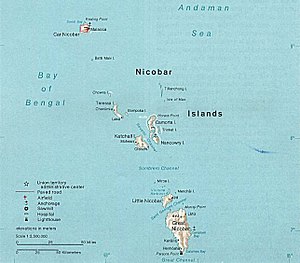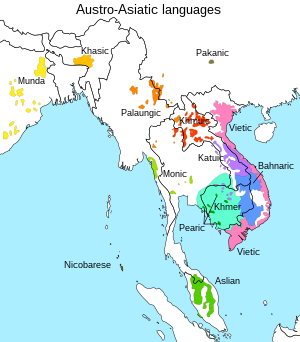尼科巴语支
(重定向自尼科巴语族)
尼科巴语支是由不到十种密切相关语言组成的南亚语系分支,由印度尼科巴群岛大多数原住民使用。共有约3万使用者(2.21万本地人)。尼科巴语支使用者最多的是卡尔尼科巴语。Paul Sidwell(2015:179)[2]认为尼科巴语支与亚斯里语支组成一个分支。
| 尼科巴语支 | |
|---|---|
| Nicobaric | |
| 使用族群 | 尼科巴人 |
| 地理分布 | 印度尼科巴群岛 |
| 谱系学分类 | 南亚语系
|
| 原始语言 | Proto-Nicobarese |
| 分支 | |
| – | |
| Glottolog | nico1262[1] |
 尼科巴群岛。卡尔尼科巴语位于顶部。 | |
 尼科巴语支 | |
尼科巴语支似乎与大尼科巴岛原住民使用的尚朋语有关(Blench & Sidwell 2011),一般认为后者在南亚语系中自成一支。[3]Paul Sidwell(2017)[4]将尚朋语划入南尼科巴语支。
语言
编辑由北至南,尼科巴语支语言有:
系属分类
编辑Paul Sidwell (2017)的尼科巴语支分类如下。[4]
另见
编辑- 尚朋语
- 原始尼科巴语构拟列表(维基词典)
参考
编辑- ^ Hammarström, Harald; Forkel, Robert; Haspelmath, Martin; Bank, Sebastian (编). Nicobaric. Glottolog 2.7. Jena: Max Planck Institute for the Science of Human History. 2016.
- ^ Sidwell, Paul. 2015. "Austroasiatic classification." In Jenny, Mathias and Paul Sidwell, eds (2015). The Handbook of Austroasiatic Languages. Leiden: Brill.
- ^ Blench, Roger, and Paul Sidwell. 2011. "Is Shom Pen a Distinct Branch?" In Sophana Srichampa and Paul Sidwell, eds. Austroasiatic Studies: Papers from ICAAL 4. Canberra: Pacific Linguistics.
- ^ 4.0 4.1 Sidwell, Paul. 2017. "Proto-Nicobarese Phonology, Morphology, Syntax: work in progress". International Conference on Austroasiatic Linguistics 7, Kiel, Sept 29-Oct 1, 2017.
- ^ Reid, Lawrence A. 1994. Morphological evidence for Austric. Oceanic Linguistics 33(2):323-344.
阅读更多
编辑- Adams, K. L. (1989). Systems of numeral classification in the Mon–Khmer, Nicobarese and Aslian subfamilies of Austroasiatic. Canberra, A.C.T., Australia: Dept. of Linguistics, Research School of Pacific Studies, Australian National University. ISBN 0-85883-373-5
- Radhakrishnan, R. (1981). The Nancowry Word: Phonology, Affixal Morphology and Roots of a Nicobarese Language. Current Inquiry Into Language and Linguistics 37. Linguistic Research Inc., P.O. Box 5677, Station 'L', Edmonton, Alberta, Canada, T6C 4G1. ISBN 0-88783-041-2
- Sidwell, Paul. 2018. Proto-Nicobarese phonology (页面存档备份,存于互联网档案馆). In Papers from the Seventh International Conference on Austroasiatic Linguistics, 101-131. Journal of the Southeast Asian Linguistics Society Special Publication No. 3. University of Hawai’i Press.